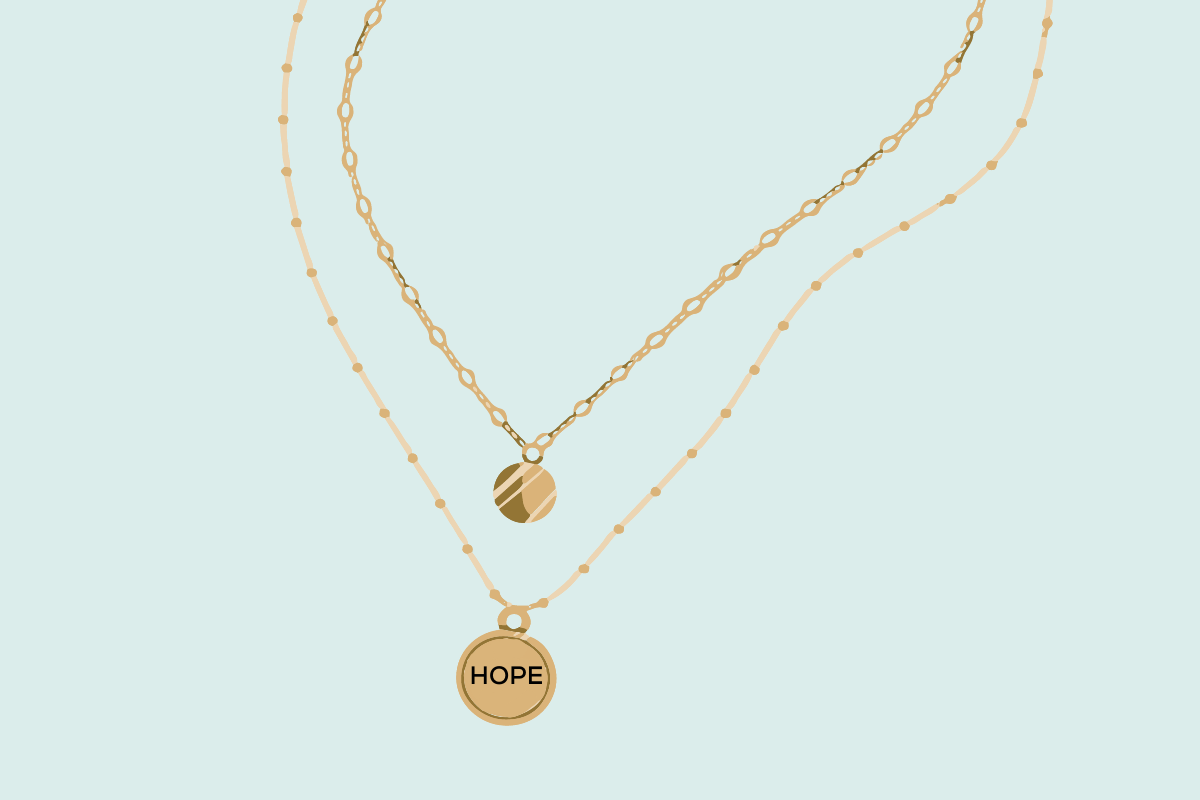After officiating a baby naming a few weeks ago, the baby’s grandmother gave me a beautiful necklace, which in bright sparkles spells out “hope.” She explained that the jeweler offers three different pendant options: faith, hope and love. The grandmother selected “hope” for me because she thought we could all use more hope right now.
Though I’d never met this woman before, it was as if she was able to read my inner world and give me a medallion to serve as a balm for my soul. Looking out at the world today, and reading in the news about violence in schools, the high rates of mental illness and suicide and ongoing conflict around the globe, I often do feel hopeless about the future. I think this concern weighs especially heavily on me as I look at my two children, ages 5 and 8, and wonder what kind of world they will inherit when they are grown. Yes, I could certainly use more hope.
After the baby naming, I wore the necklace the rest of the day and received many compliments, including from my students. Anytime one of my students compliments me on an article of clothing or an accessory, I am always surprised and excited, given that I am far from a fashionable person. However, the compliments on this necklace in particular impacted me deeply because, of all the things in my life right now that give me hope, it is my students.
In my work as a rabbi, one of my primary responsibilities is running a very outside of the box opportunity for students to celebrate emerging into adolescence called Open Tent Be Mitzvah. We use the phrase Be Mitzvah, instead of bar or bat Mitzvah, both to be more gender inclusive and because we talk about this moment in their lives as an amazing opportunity to think about how they want to “be” in the world. When I listen to my students speak, either in class or in the talks they give at their ceremonies, the way they envision being in the world makes me feel hopeful about the future.
It may seem surprising to some that time with teenagers gives me hope for the future. It’s possible it’s always been this way but, especially right now, it seems to me that teens get a bad rap. A dear friend recently told me that she’d heard from the mother of a teenager that teens today will “lie, cheat and steal for the sake of getting attention on their social media posts.” While it’s definitely possible that there is a side to my students that I don’t see as their rabbi, all I could think when I heard this comment was, “That’s really not been my experience.”
My students have integrity. They are very thoughtful about what they feel comfortable saying during their Be Mitzvah ceremonies, not wanting to select something that doesn’t feel in line with their values. For example, I’ve had students re-write their entire siddur so that the translations better reflected their sense of theology. And when I think about my students compared to what I was like as a 13-year-old, I am in awe of how comfortable they are being themselves, as opposed to trying on different ways of being cool. Knowing that middle schoolers are able to have so much self-awareness and integrity gives me hope in humanity at a time when often it feels like we adults have forgotten how to be good humans.
I’m also hopeful for the future because the vast number of my students are social justice oriented. Here is a line from my student Peyton’s d’var Torah, the talk she gave about her Torah portion: “If you look at the context clues in the portion [Matot]… we can notice that the armies on both sides are made up of men… This relates to current time because although it has changed a lot since then, women have never been fully equal to men… That is unacceptable to me.”
Sheesh! I wish I had this much courage and awareness of the world when I was 13! My Torah portion for my bat mitzvah included the 10 Commandments, something that could easily have led to talking about justice issues, and I am sure I didn’t speak about such an important and controversial topic or with as much passion as Peyton did. And she isn’t alone in being fearless about calling out social justice issues. In every single d’var Torah that my students have written this year, they are all addressing these kinds of pressing issues and the vast majority of them are taking on women’s rights and reproductive justice.
My students are innovators, never satisfied with the status quo. Instead of having a bar or bat mitzvah ceremony that looks very similar to their parents or even to their friends or siblings, they choose to create something different that fits who they are and speaks to them. Their entrepreneurial spirits have led them to create original pieces of art to represent their Jewish identity, write their own liturgy and even create their own font to use in their siddur.
In a world that feels like it is changing rapidly, I feel hope that these young people will grow into leaders who can creatively take on the challenges that the future holds, within both the secular and the Jewish world.
One of my favorite Martin Luther King Jr. quotes is, “The arc of the moral universe is long but it bends toward justice.” These past couple of years, the arc of the moral universe has certainly seemed to be bending, but not in the direction I would like. I feel so grateful that I have the opportunity to get to know Be Mitzvah students because they give me hope that in the future, they will be the adults and leaders in the room doing the bending.








